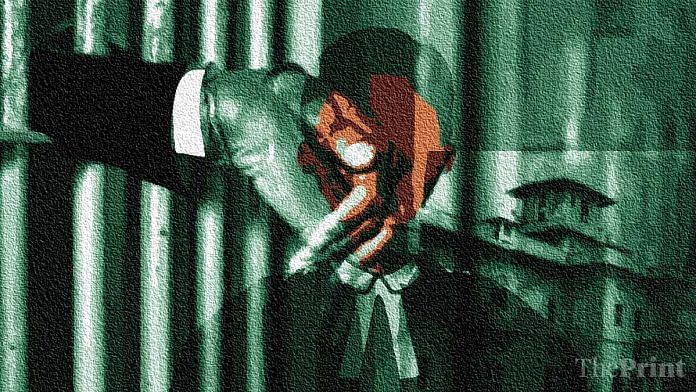Delhi Police and lawyers continue to be in a logjam since 2 November when clashes broke out between them at Tis Hazari Court. Then, a police officer was assaulted outside Saket Court complex Monday. Lawyers continued to protest Wednesday outside Delhi’s Dwarka and Karkardooma Courts, and blocked court proceedings at Saket. Two lawyers even attempted suicide at Rohini Court complex Wednesday.
ThePrint asks: Do lawyers deserve special immunity in court complexes?
Anyone who wishes to exercise power inside the court premises has to have the prior approval of a judge
 Justice RS Sodhi
Justice RS Sodhi
Former Judge, Delhi HC
Only a judge has the final authority on exercising judicial power within the jurisdiction of the court. Anyone who wishes to exercise power inside the court premises has to do so with the prior approval of a judge. So even if the police want to enter the court premises, they must inform the judge in charge of that court. The reigning judge can then choose to give or not give them permission. The decision lies entirely with the presiding officer of the court.
Nobody gets any special privileges, be it a lawyer or a police officer. Within a courtroom, it is the presiding judge’s duty to take care of both the litigants and their lawyers, or anybody else for that matter who has free access to that court. This protocol is followed to make sure that one is not harassed or deprived of justice. No one can have his or her way with the rule of law, certainly not lawyers.
As officers on duty in court, lawyers are given respect. But they are not given any special protection. They may have their designated chambers in court premises for a certain time period, which they may access. But this provision too is always regulated be it by a sessions judge, a district court judge, a High Court judge, or the Chief Justice of India.
Premise of lawyers deserving immunity is incorrect, they should be the role models of how law is followed, especially in court premises
 Amod Kanth
Amod Kanth
Former DG Police
Lawyers are perhaps the most important segment in the criminal justice system, along with the police, judiciary, and other correctional services. Lawyers are the most important stakeholders in the process of the implementation of any law.
Lawyers happen to be on both sides of a case, as prosecutors and as the defence counsel. In such a situation, they shouldn’t be merely the guardians of law, but also implement and follow the rule of law.
As a former member of the police force, I would never ask immunity for policemen because they are supposed to implement the law. The entire premise of lawyers deserving immunity is incorrect because they too are implementers of the rule of law.
It can be understandable if common people who lack knowledge or due to socio-economic compulsions are forced to ask for a concession. But even in those circumstances, they shouldn’t be granted immunity. The very demand for any kind of exemption from punishment is absurd and entirely wrong.
No one is disputing the fact that the whole tussle started over a parking issue at the Tis Hazari Court. Lawyers questioned why the Delhi Police didn’t consult the Bar Council, but why should the police ask? Are the police now expected to consult everybody before they make any move?
On the contrary, lawyers should be the role models of how laws should be abided, especially in court premises.
Also read: What IPS officers are saying in WhatsApp groups on Delhi Police crisis
Lawyers played a key role in freedom struggle, in shaping Constitution. But nobody has immunity in court
 Virag Gupta
Virag Gupta
Advocate
There are four pillars of democracy: Legislature, Executive, Judiciary and Press. The Constitution is meant for the people of India, which thrives on these pillars: Government, Judges, Advocates and Police.
Advocates in India have contributed immensely to the freedom movement, as well as to the shaping of the Constitution. Therefore, lawyers have the paramount duty to protect the Constitution. Courts are meant to dispense justice, and everyone is equal before a court of law.
In the present controversy in Delhi, the Bench headed by the Chief Justice of Delhi High Court has given protection to the lawyers in this incident.
Lawyers are an important part of the justice delivery system. But nobody, including advocates, has any immunity in court complexes. It is up to the advocates to protect their own dignity in court.
Professional standards of advocates have been outlined in the Advocates Act, 1961 as well as in the rules formulated by the Bar Council of India. The latter has asked lawyers, who have been protesting since last week, to resume working.
The matter is sub-judice and a Judicial Commission has been formed to probe the Tis Hazari episode. Both the police and the advocates are part of the legal system and must repose trust in the rule of law, so that the public’s faith in the system is maintained.
Judiciary’s response to errant lawyers has been a matter of serious concern
 Maneesh Chhibber
Maneesh Chhibber
Senior Columnist
We have seen videos of lawyers at Delhi’s Tis Hazari Court attacking police personnel Saturday and also litigants outside other local courts this week. Nobody can expect special treatment in a court of law.
But no lawyer seems to have been arrested so far. For too long, we have allowed some lawyers to take the law into their own hands. It is almost as if they have some special power, helped by the judiciary, and have been granted immunity when they clash with the rule of law.
The judiciary’s response to errant lawyers who often behave more like goons than officers in court is also a matter of concern.
More often than not, the high courts take the easy way out by burying their heads in the sand.
Unless those tasked with upholding the law give a befitting response, such incidents will continue to occur.
When civil society and law enforcement agencies refuse to respond to such strong-arm tactics by a group, it is an invitation for more trouble.
What happened at Tis Hazari has its genesis in the 2016 Patiala House court episode when Kanhaiya Kumar was attacked by lawyers — less than a km away from the Delhi Police headquarters. Both the police and the judiciary had swept this matter under the carpet.
Lawyers must know that they will be taken to task if they break the law.
Also read: Lawyer-Delhi Police row: is it tough to empathise with cops due to their poor image?
By Taran Deol, journalist at ThePrint




Lawyers are a law to themselves. The lawyers who beat Khannaya Kumasr in Delhi Court still roams free.
No.